Comprehensive Analysis of Rental Property Tax Deductions and Income
VerifiedAdded on 2020/04/21
|9
|2378
|95
Report
AI Summary
This report provides a detailed overview of tax laws related to rental properties. It covers crucial aspects such as claiming deductions, recognizing rental income, and understanding the implications of the Australian Taxation Office (ATO) guidelines. The report highlights four main areas vulnerable to errors: claiming excessive deductions, repair and maintenance claims, interest deductions, and deductions on investment expenses. It explains what counts as rental income, including rent and tenant-paid expenses, and outlines deductible expenses like management fees, mortgage interest, and property taxes. The report emphasizes the importance of accurate reporting to avoid penalties, detailing common mistakes made by taxpayers, such as failure to report income and incorrect expense claims. It also discusses tax benefits associated with rental properties, including interest deductions, property taxes, and depreciation. The report concludes by emphasizing that expenses can only be claimed if the property is genuinely available for rent and income is generated, providing a comprehensive guide for property owners to navigate rental property taxation effectively.
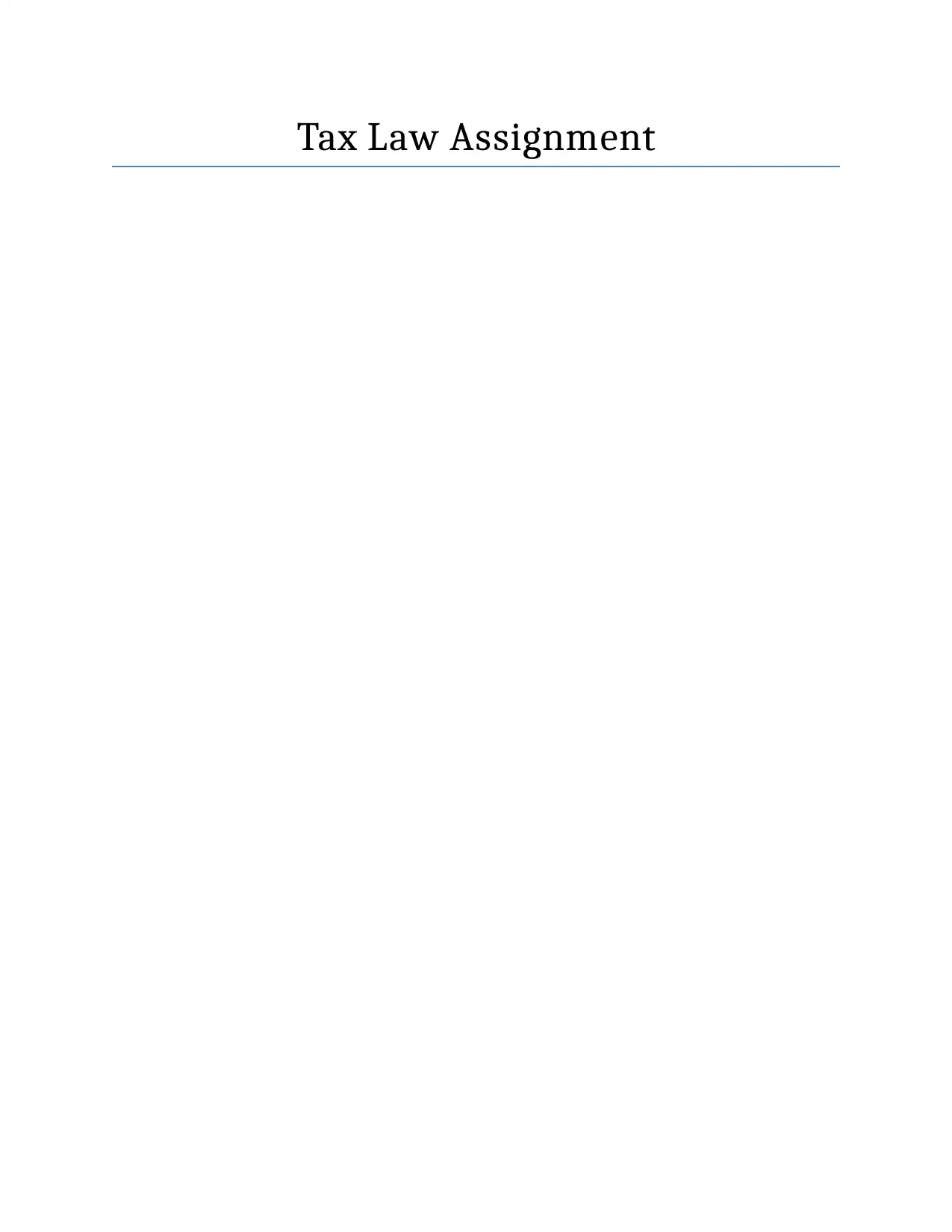
Tax Law Assignment
Paraphrase This Document
Need a fresh take? Get an instant paraphrase of this document with our AI Paraphraser
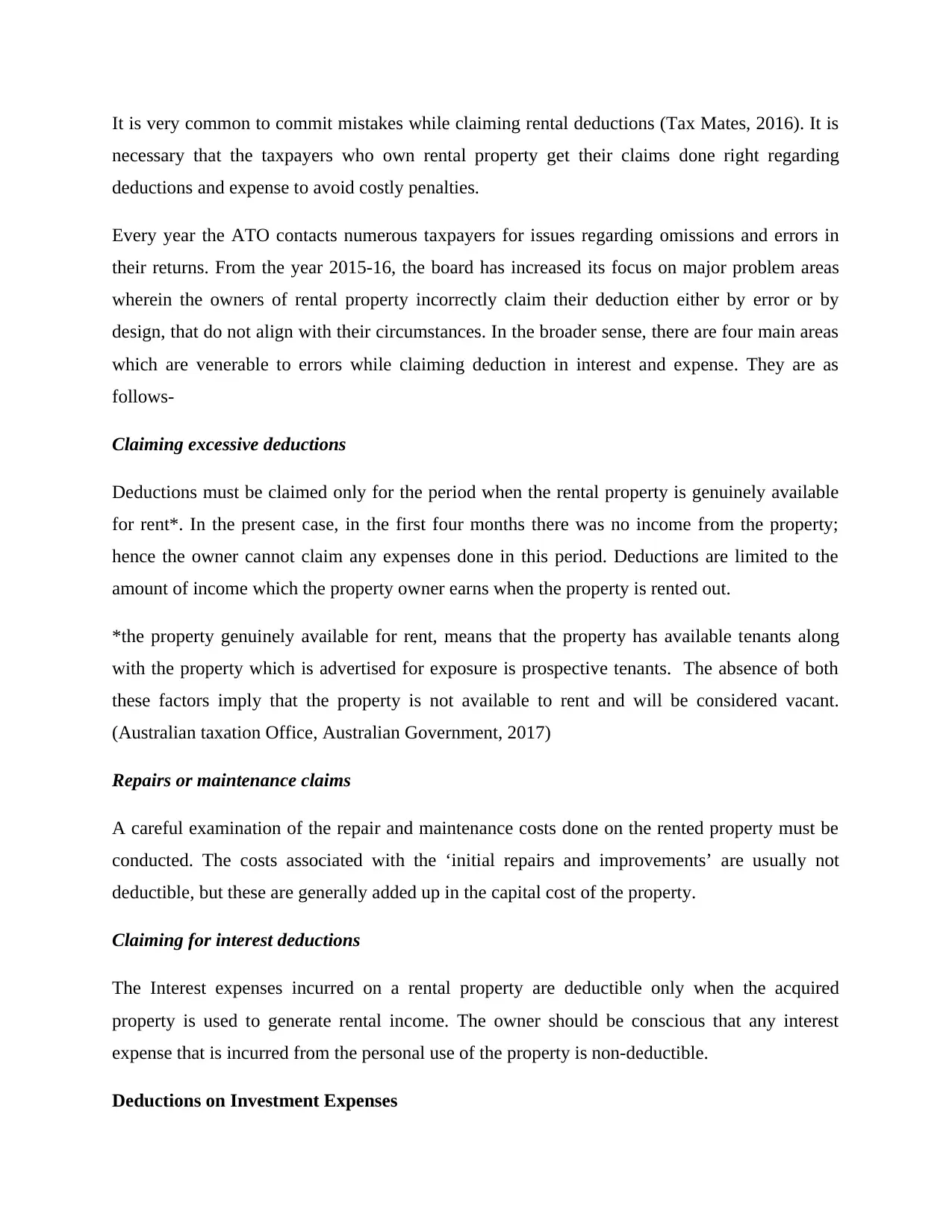
It is very common to commit mistakes while claiming rental deductions (Tax Mates, 2016). It is
necessary that the taxpayers who own rental property get their claims done right regarding
deductions and expense to avoid costly penalties.
Every year the ATO contacts numerous taxpayers for issues regarding omissions and errors in
their returns. From the year 2015-16, the board has increased its focus on major problem areas
wherein the owners of rental property incorrectly claim their deduction either by error or by
design, that do not align with their circumstances. In the broader sense, there are four main areas
which are venerable to errors while claiming deduction in interest and expense. They are as
follows-
Claiming excessive deductions
Deductions must be claimed only for the period when the rental property is genuinely available
for rent*. In the present case, in the first four months there was no income from the property;
hence the owner cannot claim any expenses done in this period. Deductions are limited to the
amount of income which the property owner earns when the property is rented out.
*the property genuinely available for rent, means that the property has available tenants along
with the property which is advertised for exposure is prospective tenants. The absence of both
these factors imply that the property is not available to rent and will be considered vacant.
(Australian taxation Office, Australian Government, 2017)
Repairs or maintenance claims
A careful examination of the repair and maintenance costs done on the rented property must be
conducted. The costs associated with the ‘initial repairs and improvements’ are usually not
deductible, but these are generally added up in the capital cost of the property.
Claiming for interest deductions
The Interest expenses incurred on a rental property are deductible only when the acquired
property is used to generate rental income. The owner should be conscious that any interest
expense that is incurred from the personal use of the property is non-deductible.
Deductions on Investment Expenses
necessary that the taxpayers who own rental property get their claims done right regarding
deductions and expense to avoid costly penalties.
Every year the ATO contacts numerous taxpayers for issues regarding omissions and errors in
their returns. From the year 2015-16, the board has increased its focus on major problem areas
wherein the owners of rental property incorrectly claim their deduction either by error or by
design, that do not align with their circumstances. In the broader sense, there are four main areas
which are venerable to errors while claiming deduction in interest and expense. They are as
follows-
Claiming excessive deductions
Deductions must be claimed only for the period when the rental property is genuinely available
for rent*. In the present case, in the first four months there was no income from the property;
hence the owner cannot claim any expenses done in this period. Deductions are limited to the
amount of income which the property owner earns when the property is rented out.
*the property genuinely available for rent, means that the property has available tenants along
with the property which is advertised for exposure is prospective tenants. The absence of both
these factors imply that the property is not available to rent and will be considered vacant.
(Australian taxation Office, Australian Government, 2017)
Repairs or maintenance claims
A careful examination of the repair and maintenance costs done on the rented property must be
conducted. The costs associated with the ‘initial repairs and improvements’ are usually not
deductible, but these are generally added up in the capital cost of the property.
Claiming for interest deductions
The Interest expenses incurred on a rental property are deductible only when the acquired
property is used to generate rental income. The owner should be conscious that any interest
expense that is incurred from the personal use of the property is non-deductible.
Deductions on Investment Expenses
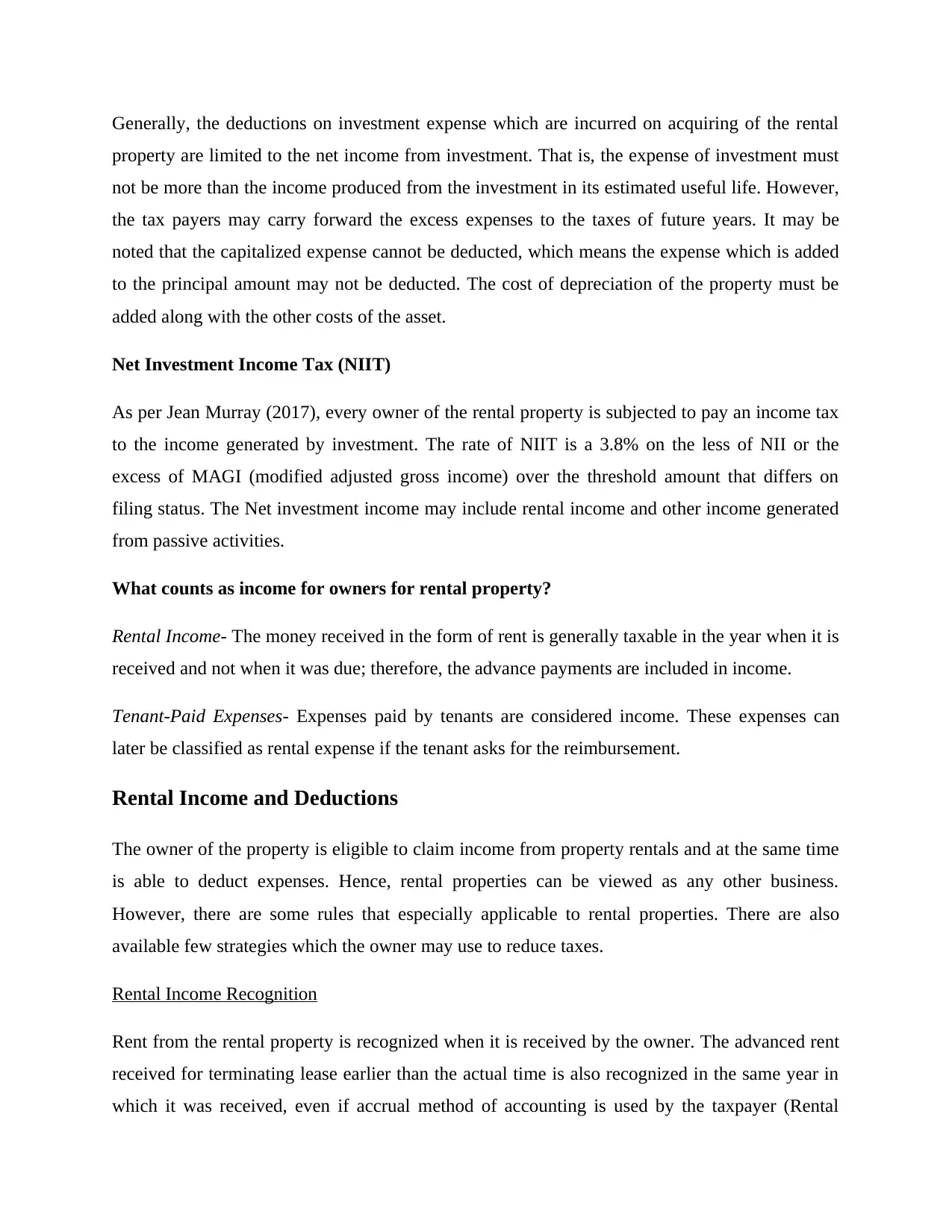
Generally, the deductions on investment expense which are incurred on acquiring of the rental
property are limited to the net income from investment. That is, the expense of investment must
not be more than the income produced from the investment in its estimated useful life. However,
the tax payers may carry forward the excess expenses to the taxes of future years. It may be
noted that the capitalized expense cannot be deducted, which means the expense which is added
to the principal amount may not be deducted. The cost of depreciation of the property must be
added along with the other costs of the asset.
Net Investment Income Tax (NIIT)
As per Jean Murray (2017), every owner of the rental property is subjected to pay an income tax
to the income generated by investment. The rate of NIIT is a 3.8% on the less of NII or the
excess of MAGI (modified adjusted gross income) over the threshold amount that differs on
filing status. The Net investment income may include rental income and other income generated
from passive activities.
What counts as income for owners for rental property?
Rental Income- The money received in the form of rent is generally taxable in the year when it is
received and not when it was due; therefore, the advance payments are included in income.
Tenant-Paid Expenses- Expenses paid by tenants are considered income. These expenses can
later be classified as rental expense if the tenant asks for the reimbursement.
Rental Income and Deductions
The owner of the property is eligible to claim income from property rentals and at the same time
is able to deduct expenses. Hence, rental properties can be viewed as any other business.
However, there are some rules that especially applicable to rental properties. There are also
available few strategies which the owner may use to reduce taxes.
Rental Income Recognition
Rent from the rental property is recognized when it is received by the owner. The advanced rent
received for terminating lease earlier than the actual time is also recognized in the same year in
which it was received, even if accrual method of accounting is used by the taxpayer (Rental
property are limited to the net income from investment. That is, the expense of investment must
not be more than the income produced from the investment in its estimated useful life. However,
the tax payers may carry forward the excess expenses to the taxes of future years. It may be
noted that the capitalized expense cannot be deducted, which means the expense which is added
to the principal amount may not be deducted. The cost of depreciation of the property must be
added along with the other costs of the asset.
Net Investment Income Tax (NIIT)
As per Jean Murray (2017), every owner of the rental property is subjected to pay an income tax
to the income generated by investment. The rate of NIIT is a 3.8% on the less of NII or the
excess of MAGI (modified adjusted gross income) over the threshold amount that differs on
filing status. The Net investment income may include rental income and other income generated
from passive activities.
What counts as income for owners for rental property?
Rental Income- The money received in the form of rent is generally taxable in the year when it is
received and not when it was due; therefore, the advance payments are included in income.
Tenant-Paid Expenses- Expenses paid by tenants are considered income. These expenses can
later be classified as rental expense if the tenant asks for the reimbursement.
Rental Income and Deductions
The owner of the property is eligible to claim income from property rentals and at the same time
is able to deduct expenses. Hence, rental properties can be viewed as any other business.
However, there are some rules that especially applicable to rental properties. There are also
available few strategies which the owner may use to reduce taxes.
Rental Income Recognition
Rent from the rental property is recognized when it is received by the owner. The advanced rent
received for terminating lease earlier than the actual time is also recognized in the same year in
which it was received, even if accrual method of accounting is used by the taxpayer (Rental
⊘ This is a preview!⊘
Do you want full access?
Subscribe today to unlock all pages.

Trusted by 1+ million students worldwide
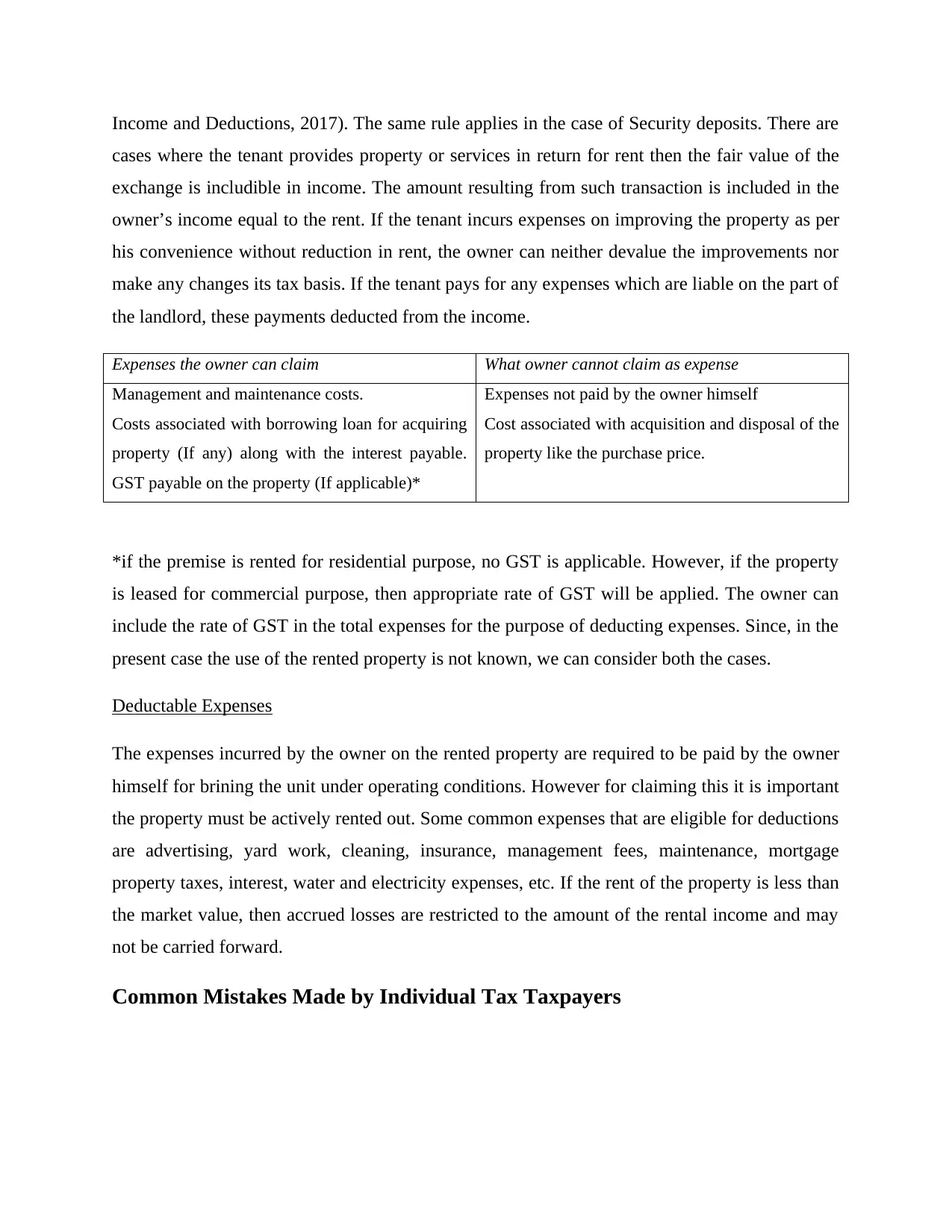
Income and Deductions, 2017). The same rule applies in the case of Security deposits. There are
cases where the tenant provides property or services in return for rent then the fair value of the
exchange is includible in income. The amount resulting from such transaction is included in the
owner’s income equal to the rent. If the tenant incurs expenses on improving the property as per
his convenience without reduction in rent, the owner can neither devalue the improvements nor
make any changes its tax basis. If the tenant pays for any expenses which are liable on the part of
the landlord, these payments deducted from the income.
Expenses the owner can claim What owner cannot claim as expense
Management and maintenance costs.
Costs associated with borrowing loan for acquiring
property (If any) along with the interest payable.
GST payable on the property (If applicable)*
Expenses not paid by the owner himself
Cost associated with acquisition and disposal of the
property like the purchase price.
*if the premise is rented for residential purpose, no GST is applicable. However, if the property
is leased for commercial purpose, then appropriate rate of GST will be applied. The owner can
include the rate of GST in the total expenses for the purpose of deducting expenses. Since, in the
present case the use of the rented property is not known, we can consider both the cases.
Deductable Expenses
The expenses incurred by the owner on the rented property are required to be paid by the owner
himself for brining the unit under operating conditions. However for claiming this it is important
the property must be actively rented out. Some common expenses that are eligible for deductions
are advertising, yard work, cleaning, insurance, management fees, maintenance, mortgage
property taxes, interest, water and electricity expenses, etc. If the rent of the property is less than
the market value, then accrued losses are restricted to the amount of the rental income and may
not be carried forward.
Common Mistakes Made by Individual Tax Taxpayers
cases where the tenant provides property or services in return for rent then the fair value of the
exchange is includible in income. The amount resulting from such transaction is included in the
owner’s income equal to the rent. If the tenant incurs expenses on improving the property as per
his convenience without reduction in rent, the owner can neither devalue the improvements nor
make any changes its tax basis. If the tenant pays for any expenses which are liable on the part of
the landlord, these payments deducted from the income.
Expenses the owner can claim What owner cannot claim as expense
Management and maintenance costs.
Costs associated with borrowing loan for acquiring
property (If any) along with the interest payable.
GST payable on the property (If applicable)*
Expenses not paid by the owner himself
Cost associated with acquisition and disposal of the
property like the purchase price.
*if the premise is rented for residential purpose, no GST is applicable. However, if the property
is leased for commercial purpose, then appropriate rate of GST will be applied. The owner can
include the rate of GST in the total expenses for the purpose of deducting expenses. Since, in the
present case the use of the rented property is not known, we can consider both the cases.
Deductable Expenses
The expenses incurred by the owner on the rented property are required to be paid by the owner
himself for brining the unit under operating conditions. However for claiming this it is important
the property must be actively rented out. Some common expenses that are eligible for deductions
are advertising, yard work, cleaning, insurance, management fees, maintenance, mortgage
property taxes, interest, water and electricity expenses, etc. If the rent of the property is less than
the market value, then accrued losses are restricted to the amount of the rental income and may
not be carried forward.
Common Mistakes Made by Individual Tax Taxpayers
Paraphrase This Document
Need a fresh take? Get an instant paraphrase of this document with our AI Paraphraser
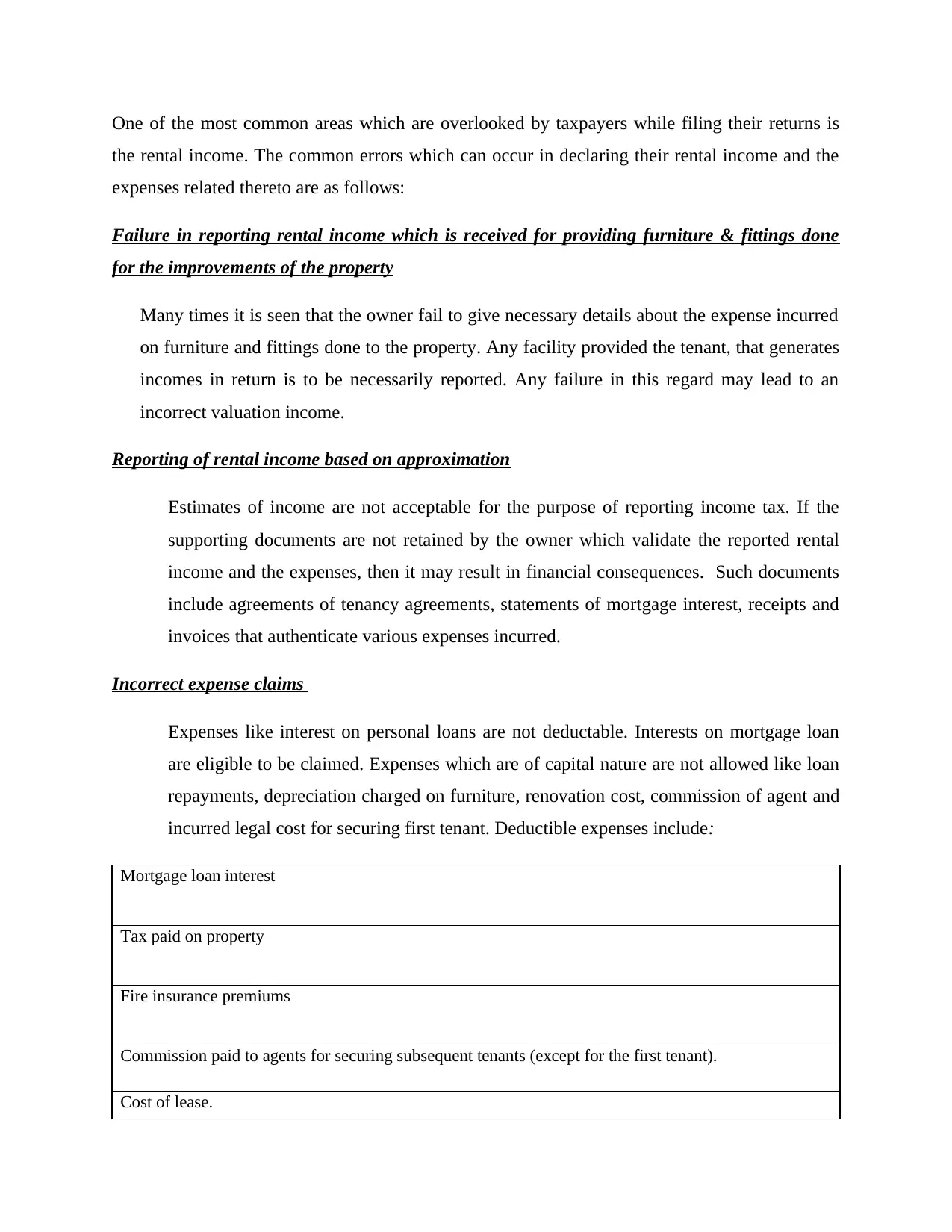
One of the most common areas which are overlooked by taxpayers while filing their returns is
the rental income. The common errors which can occur in declaring their rental income and the
expenses related thereto are as follows:
Failure in reporting rental income which is received for providing furniture & fittings done
for the improvements of the property
Many times it is seen that the owner fail to give necessary details about the expense incurred
on furniture and fittings done to the property. Any facility provided the tenant, that generates
incomes in return is to be necessarily reported. Any failure in this regard may lead to an
incorrect valuation income.
Reporting of rental income based on approximation
Estimates of income are not acceptable for the purpose of reporting income tax. If the
supporting documents are not retained by the owner which validate the reported rental
income and the expenses, then it may result in financial consequences. Such documents
include agreements of tenancy agreements, statements of mortgage interest, receipts and
invoices that authenticate various expenses incurred.
Incorrect expense claims
Expenses like interest on personal loans are not deductable. Interests on mortgage loan
are eligible to be claimed. Expenses which are of capital nature are not allowed like loan
repayments, depreciation charged on furniture, renovation cost, commission of agent and
incurred legal cost for securing first tenant. Deductible expenses include:
Mortgage loan interest
Tax paid on property
Fire insurance premiums
Commission paid to agents for securing subsequent tenants (except for the first tenant).
Cost of lease.
the rental income. The common errors which can occur in declaring their rental income and the
expenses related thereto are as follows:
Failure in reporting rental income which is received for providing furniture & fittings done
for the improvements of the property
Many times it is seen that the owner fail to give necessary details about the expense incurred
on furniture and fittings done to the property. Any facility provided the tenant, that generates
incomes in return is to be necessarily reported. Any failure in this regard may lead to an
incorrect valuation income.
Reporting of rental income based on approximation
Estimates of income are not acceptable for the purpose of reporting income tax. If the
supporting documents are not retained by the owner which validate the reported rental
income and the expenses, then it may result in financial consequences. Such documents
include agreements of tenancy agreements, statements of mortgage interest, receipts and
invoices that authenticate various expenses incurred.
Incorrect expense claims
Expenses like interest on personal loans are not deductable. Interests on mortgage loan
are eligible to be claimed. Expenses which are of capital nature are not allowed like loan
repayments, depreciation charged on furniture, renovation cost, commission of agent and
incurred legal cost for securing first tenant. Deductible expenses include:
Mortgage loan interest
Tax paid on property
Fire insurance premiums
Commission paid to agents for securing subsequent tenants (except for the first tenant).
Cost of lease.
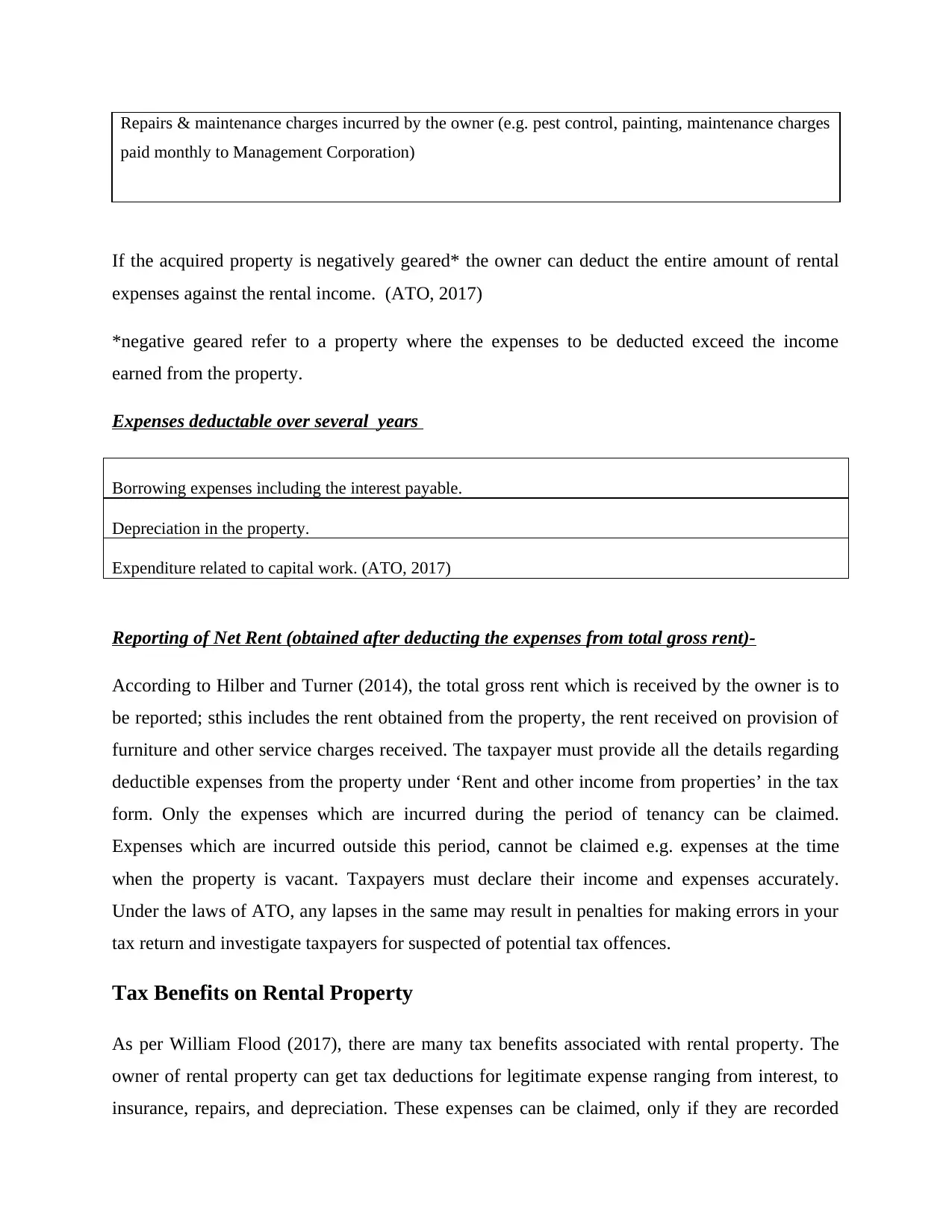
Repairs & maintenance charges incurred by the owner (e.g. pest control, painting, maintenance charges
paid monthly to Management Corporation)
If the acquired property is negatively geared* the owner can deduct the entire amount of rental
expenses against the rental income. (ATO, 2017)
*negative geared refer to a property where the expenses to be deducted exceed the income
earned from the property.
Expenses deductable over several years
Borrowing expenses including the interest payable.
Depreciation in the property.
Expenditure related to capital work. (ATO, 2017)
Reporting of Net Rent (obtained after deducting the expenses from total gross rent)-
According to Hilber and Turner (2014), the total gross rent which is received by the owner is to
be reported; sthis includes the rent obtained from the property, the rent received on provision of
furniture and other service charges received. The taxpayer must provide all the details regarding
deductible expenses from the property under ‘Rent and other income from properties’ in the tax
form. Only the expenses which are incurred during the period of tenancy can be claimed.
Expenses which are incurred outside this period, cannot be claimed e.g. expenses at the time
when the property is vacant. Taxpayers must declare their income and expenses accurately.
Under the laws of ATO, any lapses in the same may result in penalties for making errors in your
tax return and investigate taxpayers for suspected of potential tax offences.
Tax Benefits on Rental Property
As per William Flood (2017), there are many tax benefits associated with rental property. The
owner of rental property can get tax deductions for legitimate expense ranging from interest, to
insurance, repairs, and depreciation. These expenses can be claimed, only if they are recorded
paid monthly to Management Corporation)
If the acquired property is negatively geared* the owner can deduct the entire amount of rental
expenses against the rental income. (ATO, 2017)
*negative geared refer to a property where the expenses to be deducted exceed the income
earned from the property.
Expenses deductable over several years
Borrowing expenses including the interest payable.
Depreciation in the property.
Expenditure related to capital work. (ATO, 2017)
Reporting of Net Rent (obtained after deducting the expenses from total gross rent)-
According to Hilber and Turner (2014), the total gross rent which is received by the owner is to
be reported; sthis includes the rent obtained from the property, the rent received on provision of
furniture and other service charges received. The taxpayer must provide all the details regarding
deductible expenses from the property under ‘Rent and other income from properties’ in the tax
form. Only the expenses which are incurred during the period of tenancy can be claimed.
Expenses which are incurred outside this period, cannot be claimed e.g. expenses at the time
when the property is vacant. Taxpayers must declare their income and expenses accurately.
Under the laws of ATO, any lapses in the same may result in penalties for making errors in your
tax return and investigate taxpayers for suspected of potential tax offences.
Tax Benefits on Rental Property
As per William Flood (2017), there are many tax benefits associated with rental property. The
owner of rental property can get tax deductions for legitimate expense ranging from interest, to
insurance, repairs, and depreciation. These expenses can be claimed, only if they are recorded
⊘ This is a preview!⊘
Do you want full access?
Subscribe today to unlock all pages.

Trusted by 1+ million students worldwide
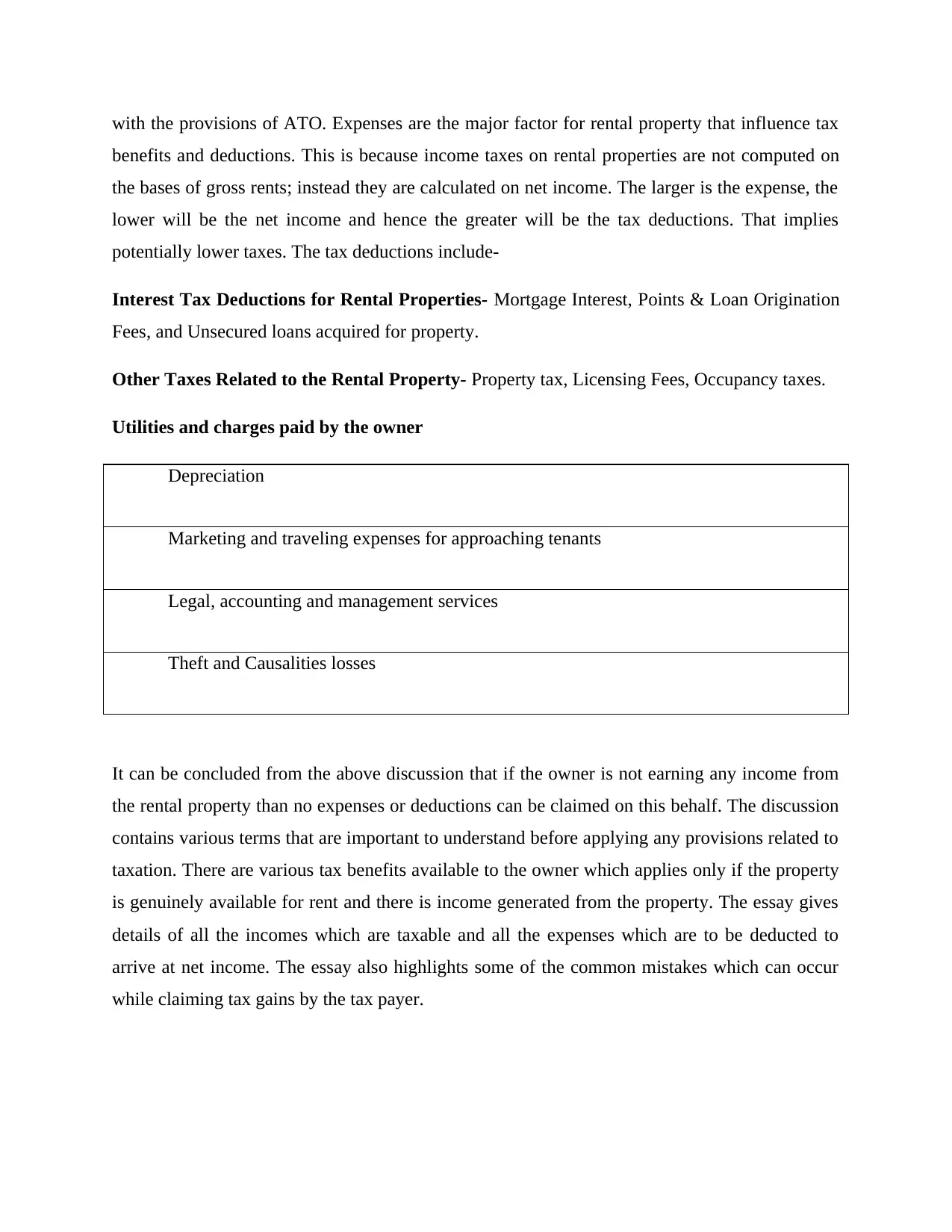
with the provisions of ATO. Expenses are the major factor for rental property that influence tax
benefits and deductions. This is because income taxes on rental properties are not computed on
the bases of gross rents; instead they are calculated on net income. The larger is the expense, the
lower will be the net income and hence the greater will be the tax deductions. That implies
potentially lower taxes. The tax deductions include-
Interest Tax Deductions for Rental Properties- Mortgage Interest, Points & Loan Origination
Fees, and Unsecured loans acquired for property.
Other Taxes Related to the Rental Property- Property tax, Licensing Fees, Occupancy taxes.
Utilities and charges paid by the owner
Depreciation
Marketing and traveling expenses for approaching tenants
Legal, accounting and management services
Theft and Causalities losses
It can be concluded from the above discussion that if the owner is not earning any income from
the rental property than no expenses or deductions can be claimed on this behalf. The discussion
contains various terms that are important to understand before applying any provisions related to
taxation. There are various tax benefits available to the owner which applies only if the property
is genuinely available for rent and there is income generated from the property. The essay gives
details of all the incomes which are taxable and all the expenses which are to be deducted to
arrive at net income. The essay also highlights some of the common mistakes which can occur
while claiming tax gains by the tax payer.
benefits and deductions. This is because income taxes on rental properties are not computed on
the bases of gross rents; instead they are calculated on net income. The larger is the expense, the
lower will be the net income and hence the greater will be the tax deductions. That implies
potentially lower taxes. The tax deductions include-
Interest Tax Deductions for Rental Properties- Mortgage Interest, Points & Loan Origination
Fees, and Unsecured loans acquired for property.
Other Taxes Related to the Rental Property- Property tax, Licensing Fees, Occupancy taxes.
Utilities and charges paid by the owner
Depreciation
Marketing and traveling expenses for approaching tenants
Legal, accounting and management services
Theft and Causalities losses
It can be concluded from the above discussion that if the owner is not earning any income from
the rental property than no expenses or deductions can be claimed on this behalf. The discussion
contains various terms that are important to understand before applying any provisions related to
taxation. There are various tax benefits available to the owner which applies only if the property
is genuinely available for rent and there is income generated from the property. The essay gives
details of all the incomes which are taxable and all the expenses which are to be deducted to
arrive at net income. The essay also highlights some of the common mistakes which can occur
while claiming tax gains by the tax payer.
Paraphrase This Document
Need a fresh take? Get an instant paraphrase of this document with our AI Paraphraser
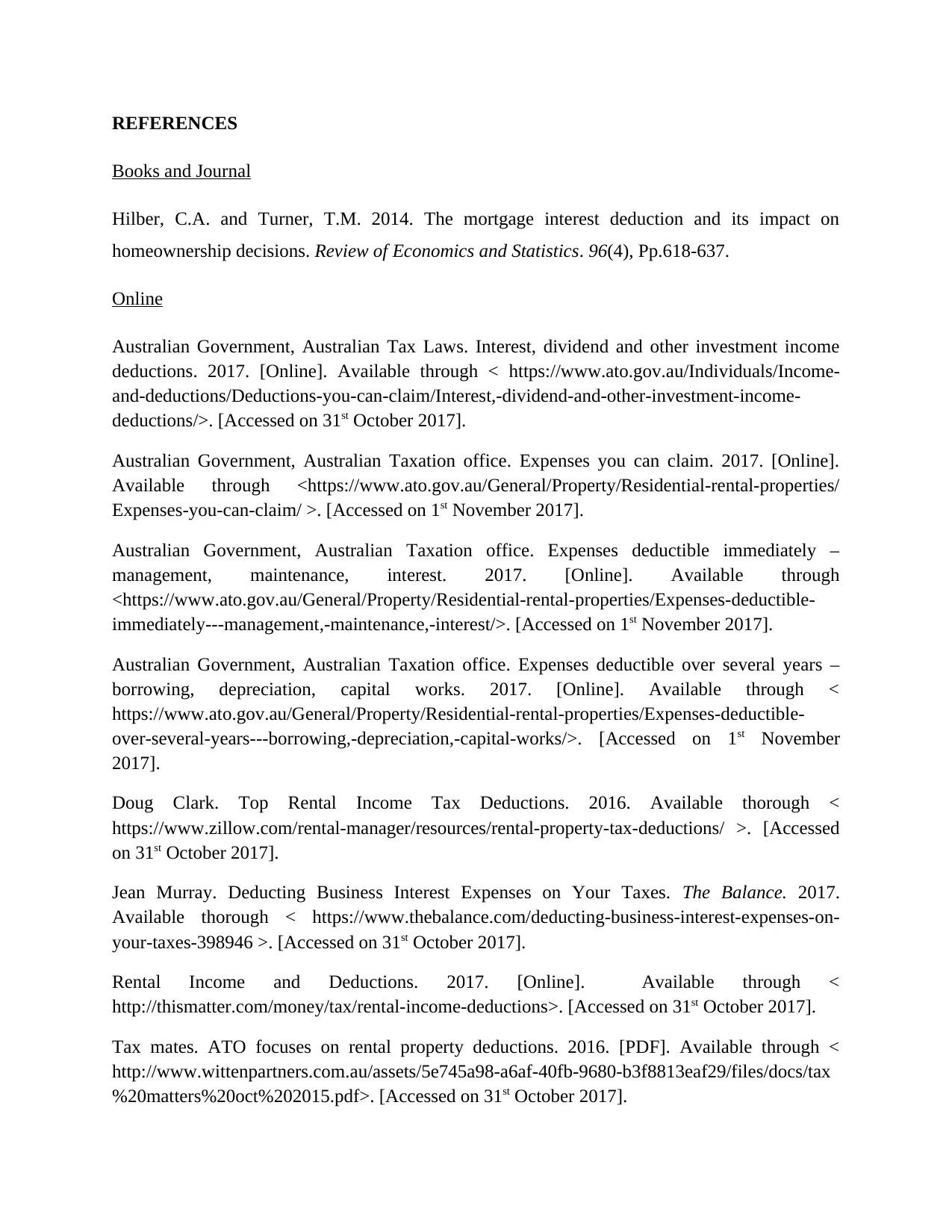
REFERENCES
Books and Journal
Hilber, C.A. and Turner, T.M. 2014. The mortgage interest deduction and its impact on
homeownership decisions. Review of Economics and Statistics. 96(4), Pp.618-637.
Online
Australian Government, Australian Tax Laws. Interest, dividend and other investment income
deductions. 2017. [Online]. Available through < https://www.ato.gov.au/Individuals/Income-
and-deductions/Deductions-you-can-claim/Interest,-dividend-and-other-investment-income-
deductions/>. [Accessed on 31st October 2017].
Australian Government, Australian Taxation office. Expenses you can claim. 2017. [Online].
Available through <https://www.ato.gov.au/General/Property/Residential-rental-properties/
Expenses-you-can-claim/ >. [Accessed on 1st November 2017].
Australian Government, Australian Taxation office. Expenses deductible immediately –
management, maintenance, interest. 2017. [Online]. Available through
<https://www.ato.gov.au/General/Property/Residential-rental-properties/Expenses-deductible-
immediately---management,-maintenance,-interest/>. [Accessed on 1st November 2017].
Australian Government, Australian Taxation office. Expenses deductible over several years –
borrowing, depreciation, capital works. 2017. [Online]. Available through <
https://www.ato.gov.au/General/Property/Residential-rental-properties/Expenses-deductible-
over-several-years---borrowing,-depreciation,-capital-works/>. [Accessed on 1st November
2017].
Doug Clark. Top Rental Income Tax Deductions. 2016. Available thorough <
https://www.zillow.com/rental-manager/resources/rental-property-tax-deductions/ >. [Accessed
on 31st October 2017].
Jean Murray. Deducting Business Interest Expenses on Your Taxes. The Balance. 2017.
Available thorough < https://www.thebalance.com/deducting-business-interest-expenses-on-
your-taxes-398946 >. [Accessed on 31st October 2017].
Rental Income and Deductions. 2017. [Online]. Available through <
http://thismatter.com/money/tax/rental-income-deductions>. [Accessed on 31st October 2017].
Tax mates. ATO focuses on rental property deductions. 2016. [PDF]. Available through <
http://www.wittenpartners.com.au/assets/5e745a98-a6af-40fb-9680-b3f8813eaf29/files/docs/tax
%20matters%20oct%202015.pdf>. [Accessed on 31st October 2017].
Books and Journal
Hilber, C.A. and Turner, T.M. 2014. The mortgage interest deduction and its impact on
homeownership decisions. Review of Economics and Statistics. 96(4), Pp.618-637.
Online
Australian Government, Australian Tax Laws. Interest, dividend and other investment income
deductions. 2017. [Online]. Available through < https://www.ato.gov.au/Individuals/Income-
and-deductions/Deductions-you-can-claim/Interest,-dividend-and-other-investment-income-
deductions/>. [Accessed on 31st October 2017].
Australian Government, Australian Taxation office. Expenses you can claim. 2017. [Online].
Available through <https://www.ato.gov.au/General/Property/Residential-rental-properties/
Expenses-you-can-claim/ >. [Accessed on 1st November 2017].
Australian Government, Australian Taxation office. Expenses deductible immediately –
management, maintenance, interest. 2017. [Online]. Available through
<https://www.ato.gov.au/General/Property/Residential-rental-properties/Expenses-deductible-
immediately---management,-maintenance,-interest/>. [Accessed on 1st November 2017].
Australian Government, Australian Taxation office. Expenses deductible over several years –
borrowing, depreciation, capital works. 2017. [Online]. Available through <
https://www.ato.gov.au/General/Property/Residential-rental-properties/Expenses-deductible-
over-several-years---borrowing,-depreciation,-capital-works/>. [Accessed on 1st November
2017].
Doug Clark. Top Rental Income Tax Deductions. 2016. Available thorough <
https://www.zillow.com/rental-manager/resources/rental-property-tax-deductions/ >. [Accessed
on 31st October 2017].
Jean Murray. Deducting Business Interest Expenses on Your Taxes. The Balance. 2017.
Available thorough < https://www.thebalance.com/deducting-business-interest-expenses-on-
your-taxes-398946 >. [Accessed on 31st October 2017].
Rental Income and Deductions. 2017. [Online]. Available through <
http://thismatter.com/money/tax/rental-income-deductions>. [Accessed on 31st October 2017].
Tax mates. ATO focuses on rental property deductions. 2016. [PDF]. Available through <
http://www.wittenpartners.com.au/assets/5e745a98-a6af-40fb-9680-b3f8813eaf29/files/docs/tax
%20matters%20oct%202015.pdf>. [Accessed on 31st October 2017].
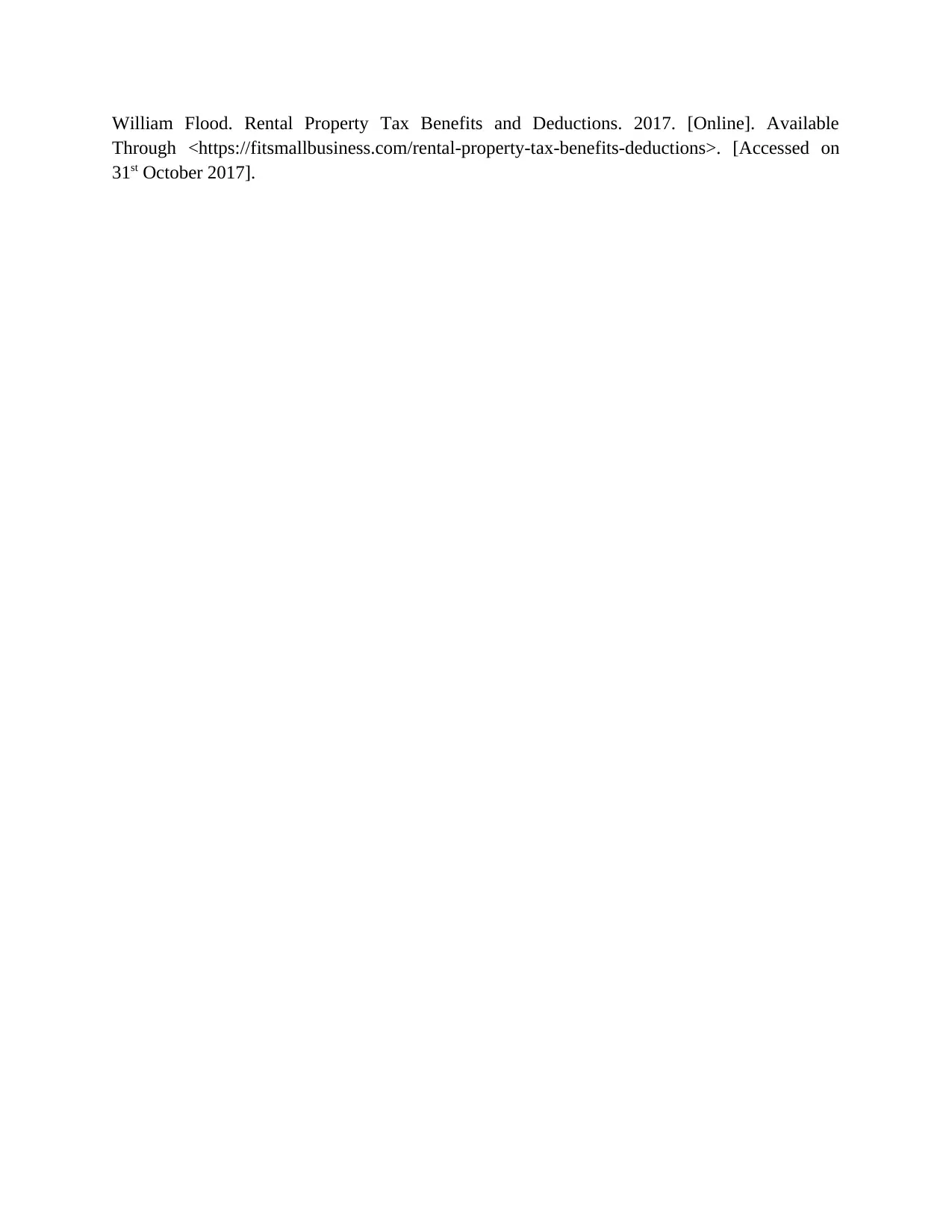
William Flood. Rental Property Tax Benefits and Deductions. 2017. [Online]. Available
Through <https://fitsmallbusiness.com/rental-property-tax-benefits-deductions>. [Accessed on
31st October 2017].
Through <https://fitsmallbusiness.com/rental-property-tax-benefits-deductions>. [Accessed on
31st October 2017].
⊘ This is a preview!⊘
Do you want full access?
Subscribe today to unlock all pages.

Trusted by 1+ million students worldwide
1 out of 9
Related Documents
Your All-in-One AI-Powered Toolkit for Academic Success.
+13062052269
info@desklib.com
Available 24*7 on WhatsApp / Email
![[object Object]](/_next/static/media/star-bottom.7253800d.svg)
Unlock your academic potential
Copyright © 2020–2026 A2Z Services. All Rights Reserved. Developed and managed by ZUCOL.





